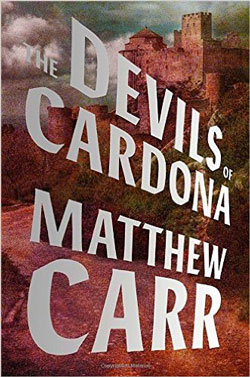 The Devils of Cardona by Matthew Carr is a gripping historical thriller set in sixteenth-century Spain.
The Devils of Cardona by Matthew Carr is a gripping historical thriller set in sixteenth-century Spain.
What a timely, topical book. Ostensibly a medieval murder mystery, The Devils of Cardona draws strong parallels with a world currently caught up in theological hysteria, warning both of the perils of forgetting the beauty and kindnesses of religion and of allowing xenophobia to cloak cynical and selfish political machinations.
Set in 16th-century Spain, with the Inquisition dominating the daily landscape of Spanish lives, The Devils of Cardona starts with the brutal murder of an unpopular priest in a small Aragonese village near the border with France. Arabic words scrawled in the priest’s blood across the walls point the finger at the local Moriscos, former Muslims forcibly converted to Catholicism.
With the nobility of Aragon prickly about their rights under Castilian rule, an adviser to King Philip II appoints a judge with a reputation for fairness and justice to travel to the remote region to investigate. With a small entourage, Licenciado Bernardo Mendoza sets out on a trip that will find him at odds with nobility and clergy, the faithful and heretics, and old friends and new alike.
In this thrilling, twisting tale, there are only two certainties: everyone’s situation is precarious and, perhaps as a result, everybody lies. But, not necessarily for evil purposes:
The limpid blue eyes stared at him calmly, but Mendoza sensed the anxiety behind them. She really did have the face of an angel, he thought. It was difficult to gaze on such loveliness and believe that it was capable of deception. Yet she had lied again and again, just as […] the Moriscos had lied, and if he failed to report what he knew, then he would be complicit in the lies they’d told. In that moment he thought of his Morisco childhood friends, many years ago, when they had played games of Moors and Christians at the Alhambra palace and taken turns on each side. He thought of Galera and Lepanto and the other battles he’d fought in. He thought of the Lutheran nun on the Inquisition pyre and all the other persecutions of men and women who only wanted to worship their own gods in their own way, and it seemed to him that [her] lies were necessary, that they were honorable and even benevolent, in comparison with the lies of [certain others].
As realistic in its depiction of moral nuance and ambiguity as it is firmly grounded in its setting, The Devils of Cardona constantly reminds us that life in medieval times was, for the vast majority of people, short and brutish. Everyone dies, often unexpectedly (and sometimes, maddeningly, while I was busy cheering them on to victory), or at the very least faces mortal peril. Matthew Carr writes pulse-pounding action sequences, but even in the midst of battle or a manhunt, there’s always time for philosophical reflection, as here, where Licenciado Mendoza’s devil-may-care cousin is hiding from bandits in Cardona:
Where did the soul go? What form did it take if it had no body? These questions passed through his mind as he lay there on the stony ground listening to the wolves calling back and forth to one another in the distance and watching the clouds slowly part to reveal a pale half-moon and a sky thick with stars. He picked out the constellations that he recognized and conjured others from his imagination in the shapes of dragons, ships, animals and scimitars.
Perhaps that was where the soul went after death. Perhaps all the souls of all the people who had ever existed were floating up there in a stream of dust among those fields of stars. But it was also possible that [St Thomas] Aquinas was wrong, that the only world that really mattered was the one he saw with his own eyes and felt in his own flesh. Whatever the truth, he considered himself fortunate to have survived in it for so long when he should have died many times over and to have seen and done things that men who lived to twice his age would never experience.
The Devils of Cardona is one of those rare historical mysteries that is as thrilling as it is thoughtful. Aside from violence and philosophy, it encompasses political machinations and sexual intrigue and seems ripe for translation to the screen. In this day and age, its message of religious and social tolerance would be well served by being further disseminated, even as it is already beautifully delivered in this intelligent, entertaining book.
To learn more or order a copy, visit:
opens in a new window![]() opens in a new window
opens in a new window![]() opens in a new window
opens in a new window![]() opens in a new window
opens in a new window![]()
Doreen Sheridan is a freelance writer living in Washington, D.C. She
microblogs on Twitter @dvaleris.
Read all posts by Doreen Sheridan for Criminal Element.

They added 58 for the sixth wicket as Hasaranga scored 36 from 21 balls to steer them to a challenging total.
Fast bowler Haris Rauf led Pakistan’s bowling attack with 3-29.